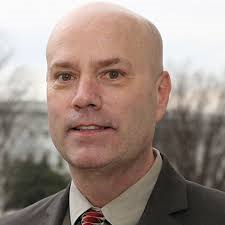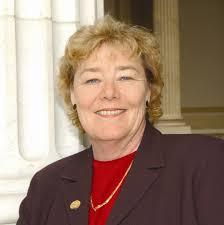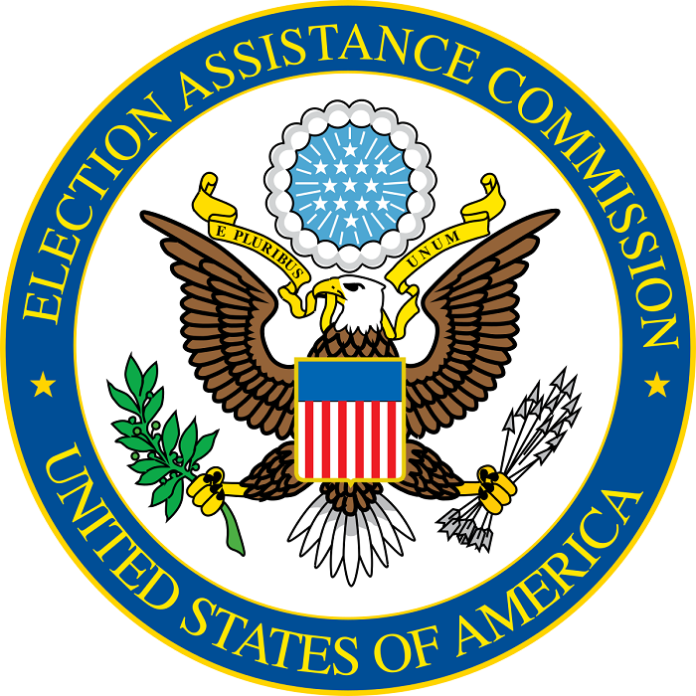Officially, Brian Newby’s term at the Election Assistance Commission comes to an end next week after almost four years of political turbulence.
Unofficially, the former Johnson County election commissioner’s term effectively ended in 2016 when he agreed to allow Kansas and two other states to require proof of citizenship when registering to vote using a federal form.
“That became a pretty defining thing,” Newby said in an interview with the Sunflower State Journal, reflecting on his time at the commission.

Next week, Newby leaves his job as executive director at the Election Assistance Commission after his four-year term wasn’t extended following years of controversy over voting rights and his management skills.
Newby departs without regret and unbowed by the controversy. He touts efforts to build the agency into relevance despite congressional efforts to shut the agency down after losing a quorum of commissioners.
He points to the agency’s distribution of $380 million in election assistance grants in 45 days last year. He noted recently that all four commission seats were filled for the first time in a decade.
Despite criticism about his management ability and charges that he tried to suppress voting with the citizenship requirement, Newby stands his ground.
He said the EAC is a relevant and trusted agency as it works to help administer elections with a tight budget.
“I am really proud of what I’ve done here.”
Newby said he thought the commission’s decision not to extend his term was part of a strategy by congressional Democrats to drive him out, especially after gaining control of the House following the 2018 election.
“There was a clear plan on their part,” Newby said recently.
“I underestimated how political D.C. is,” he said. “I thought if I was successful in not having the agency shut down, then I would have demonstrated my value and I would be renewed.”
Since 2016, Newby has been at the center of a voting rights debate, grouped along with former Kansas Secretary of State Kris Kobach, a staunch advocate for the citizenship requirement.
Already beset by questions in Johnson County over how he ran the election office, Newby ran into more turmoil not just about the citizenship question but also over his management of the federal agency charged with ensuring the smooth operation of elections nationally.
He came under the scrutiny of powerful and influential members of Congress — including the House majority leader and a presidential candidate — who not only blamed him for allegedly trying to keep African Americans from voting but also think he’s been a managerial mess.
“It is not a lifelong dream, believe me, to be named by so many members of Congress and a senator or two or three,” Newby said.
“If I had run for office, I think that would be much more fair game. But I didn’t run for office,” he said. “To me, it’s bullying on their part. I think it’s wrong, but I can’t change that.”
One leading Democratic congresswoman described leadership at the EAC as “gross mismanagement.”
Another congressman said he thought there was a cancer growing on the commission.
A third member of Congress described Newby as being under a “cloud of scandal and rampant mismanagement,” alluding to issues in Johnson County where an audit questioned use of taxpayer funds.
The late Democratic Congressman Elijah Cummings and two other lawmakers said that Newby’s decision on the citizenship issue would negatively affect the ability to vote.
Nevetheless, Newby won’t retreat from his work.
“I don’t lack confidence in my abilities, and I think I have a pretty good track record of results,” he said.
More controversy bubbled up at a hearing of the House Administration Committee in May, when lawmakers quizzed agency commissioners about their confidence in Newby amid reports of low employee morale.
Two of the commissioners — Chairwoman Christy McCormick and Donald Palmer — backed Newby. Commissioner Thomas Hicks was lukewarm, saying the commission should open the job up to applicants.
“I think there have been some growing pains,” Hicks told the committee.
“I think there are some good things that he has done. I think there are some bad things that he’s done,” he said.
“I think that’s something the commission should look at, whether or not we want to retain him and move forward or whether we want to open this up for new additional folks to apply for the job.”
A month later, Politico reported that Newby was impeding election security work at the EAC as part of a story that raised overall questions about his management skills.
Quoting seven anonymous sources, Politico reported Newby also had “micromanaged employees’ interactions with partners outside the agency and routinely ignored staff questions.”
After the Politico story, three key lawmakers — House Majority Leader Steny Hoyer; Sen. Amy Klobuchar, ranking member of the Senate Rules and Administration Committee; and House Administration Committee Chair Zoe Lofgren — sent a letter to the commission saying it should start looking for a successor to Newby when his term ended.
They were bothered by reports detailing management problems at the EAC as well as Newby’s decision allowing Kansas, Alabama and Georgia to add the citizenship requirement to the federal form.
“These reports are unacceptable, and we strongly urge you to take action to ensure that the commission has a competent and strong executive director at the helm,” they told the commission.
The political pressure reached a crescendo early last month, when the EAC deadlocked in deciding whether Newby’s four-year term should be renewed. The tie vote on the commission — two for keeping him and two against — meant that Newby will be out at the commission on Oct. 22.

Lofgren, the chair of the House Administration Committee, is hopeful the leadership change will produce positive results.
“As we seek to harden our election infrastructure, the Election Assistance Commission has tremendous potential to be a credible resource that state and local election officials can trust,” Lofgren said in a statement emailed to the Sunflower State Journal.
“Unfortunately, serious personnel mismanagement and occasional hyper-partisanship by executive leadership at the commission has too often distracted from their mission.
“I am glad that the EAC has committed to new leadership, and it is important they now act swiftly to ensure the commission has the necessary personnel in place to ensure our nation’s elections are secure and free from interference.”
Newby counters the criticism with letters of support from secretaries of state in Indiana and North Dakota, who urged that his term be extended. They found him to be effective, fair and experienced in the administration of elections.
“The EAC is to be a bipartisan federal agency created to assist state and local election officials in the administration of federal elections,” North Dakota Secretary of State Alvin Yaeger wrote to the commission. “Please do not let partisan influences tempt you to change from that mission.”
Newby said the decision allowing Kansas, Alabama and Georgia to add the citizenship requirement to the federal form was central to the controversy he faced at the commission.
His decision was later challenged in court, which blocked the decision to allow the changes to the federal form. The case continues in 2019.
Looking back, Newby said his critics misunderstood his intentions, which were questioned when Kobach told The Associated Press in 2016 that he had encouraged one or two EAC commissioners to hire Newby.
Newby said his association with Kobach, who reappointed him Johnson County election commissioner in 2014, just exacerbated the criticism of his decision to allow proof of citizenship.
“Anybody who has had any affiliation with Kris Kobach has been attacked,” Newby said. “I haven’t talked to Kris Kobach in two years, and that’s a big piece of this. He is universally hated by one party, and there’s an assumption I am his bud.”
Not everyone wanted Newby out. Two of the commissioners — McCormick and Palmer — voted to extend Newby’s term. McCormick attached four pages of Newby’s accomplishments to her vote. Here are the ballots cast by all four commissioners with their comments and McCormick’s narrative.
McCormick said the Democrats’ criticism of Newby was “baseless” and “unsupported by any evidence.” She said efforts to move Newby out of the EAC were “purely political and partisan.”
She said he turned the agency around from “near death” and has led the staff to produce “excellent work.”
Back in 2017, Hicks said he thought that Newby had overstepped his authority when he allowed Kansas and two other states to require proof of citizenship for the federal voter registration form.
“I believe the executive director’s decision was not consistent with agency precedent and in violation” of the National Voter Registration Act, Hicks wrote in a memo that was filed with the court.
“I do not believe the executive director has authority to reverse precedent or approve an action inconsistent with policy and precedent without express consent of at least three commissioners,” Hicks wrote.
Kobach defended Newby in an interview.
“If it’s a political hit job done on him by the Democrats on the Election Assistance Commission, that’s a sad state of affairs for a commission that’s supposed to be facilitating what the states want to do,” he said.
“What Mr. Newby did was abide by the request of states that had proof of citizenship, simply saying, ‘Can you help us implement our laws, or are you going to stand in the way?’”
Myrna Pérez, director of the Brennan Center’s Voting Rights and Elections Program, said she hopes the change in leadership at the EAC will bring a change in approach to voting.
“We are hopeful that the next person in that position supports a change in EAC policy because we believe that the policy we have challenged is bad for voters,” Pérez said.
Newby conceded there was a perception that he allowed the change on the federal voter registration form on behalf of Kobach.
He said that’s not true, and he did not ask Kobach for his help to land the EAC job. He said he was offended by the idea that he didn’t get the job on his own merits. He said he didn’t ask Kobach for a recommendation and used former Secretary of State Ron Thornburgh as a reference.

Critics said that Newby’s association with Kobach is tangential to the decision he made on the citizenship question. They say the EAC is better off under new management.
“Brian Newby’s unilateral and illegal decision to add a documentary proof-of-citizenship requirement to the federal voter registration form, without the consultation of the EAC commissioners, demonstrated that he was wholly unfit for the role of EAC executive director,” said Dale Ho, director of the Voting Rights Project at the American Civil Liberties Union.
“His association with Kobach was known at the time that he was hired,” Ho wrote in an email. “His terrible record as EAC (executive director), not his professional connections, were his undoing.”
Newby said he followed the law when he agreed to the citizenship requirement. “Citizenship had nothing to do with my thought process.”
While he said he opposes the idea of the citizenship requirement, he still has no second thoughts about his decision, adding that he thought the agency would have been sued regardless of how it proceeded.
Newby said he thought the citizenship requirement would mostly hurt women who had changed their name because they were married or divorced. Yet, he stood by his decision.
“I don’t regret it because I made the right decision,” he said. “I’ve taken a lot of heat. I have a propensity to lead with my chin on things like that. It has not worked out well for me, but I made the right decision.”













